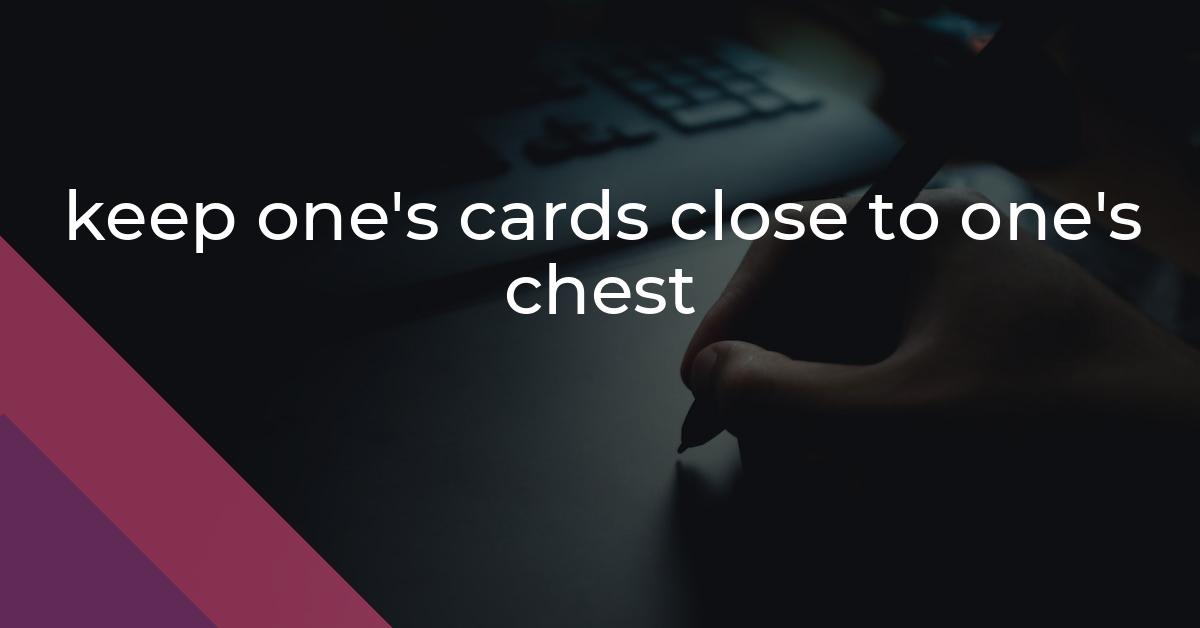keep one’s cards close to one’s chest: Idiom Meaning and Origin
What does ‘keep one's cards close to one's chest’ mean?
The idiom "keep one's cards close to one's chest" means to keep one's thoughts, plans, or intentions secret or hidden in order to maintain an advantage or not reveal too much information.

Idiom Explorer
The idiom "up one's sleeve" means to have a secret plan or strategy, usually hidden until the right moment.
The idiom "laugh in one's sleeve" means to secretly or quietly find something amusing or funny without showing it openly.
The idiom "keep mum" means to remain silent or keep quiet about something, typically to maintain secrecy or avoid revealing information.
The idiom "keep an eye open" means to remain alert or vigilant, to pay close attention to something or someone in order to avoid missing any important information or opportunities.
The idiom "keep a low profile" means to avoid attracting attention or publicity, and to remain inconspicuous or discreet in one's actions or behavior.
The idiom "keep a lid on" means to maintain control over something, especially to prevent it from becoming known or causing trouble.
The idiom "keep a close watch" means to closely monitor or observe something or someone, usually with the goal of ensuring their safety, security, or well-being.
The idiom "in one's hip pocket" means to have someone under complete control or influence. It suggests that the person is easily manipulated or controlled, like an object kept in one's back pocket.
The idiom "in one's head" means to have a thought, idea, or plan solely within the mind without expressing or sharing it with others.
Unveiling the Strategy
The idiom "keep one's cards close to one's chest" has its origins in the world of card games. It is believed to have first appeared in the late 19th century and is still in common usage today. The phrase is used when someone is being cautious, secretive, or not revealing their true intentions or feelings.
The literal interpretation of the idiom refers to someone handling playing cards in a way that prevents others from seeing or knowing what cards they hold. This behavior is commonly observed in poker games, where players strategically position their hands and keep their cards hidden from their opponents. By doing so, they can maintain an element of surprise and ensure that their opponents cannot obtain any significant advantage.
Metaphorically, "keeping one's cards close to one's chest" goes beyond card games and can be applied to various situations in life. This suggests a sense of guarding oneself, being reserved, or being cautious about revealing personal information, intentions, or strategies. This behavior can be seen in interpersonal relationships, negotiations, business dealings, and even in everyday conversations.
When someone chooses to "keep their cards close to their chest," they are deliberately opting for a more cautious approach. This deliberate behavior can have various motivations, such as protecting one's interests, avoiding vulnerability, gaining a strategic advantage, or maintaining a sense of mystery. It can also be used as a defensive measure, preventing others from taking advantage of one's weaknesses or using the revealed information against them.
The idiom "keep one's cards close to one's chest" originates from the world of card games, specifically poker. It has evolved metaphorically to refer to a cautious and secretive approach in various aspects of life. The idiom signifies guarding oneself, being reserved, and not revealing true intentions or feelings. While the true origin of the idiom remains unknown, its usage and meaning have endured over time. This provides insight into human behavior and the complexities of interpersonal interactions, leaving space for interpretation and contemplation.
The related idiom "up one's sleeve" has a similarly metaphorical meaning. When someone has something "up their sleeve," it means they have a secret plan or resource that they can use to their advantage. Just like keeping one's cards close to one's chest, having something up one's sleeve involves being strategic, cautious, and not revealing all of one's options or intentions right away.
This phrase, "up one's sleeve," is believed to have originated from the world of magic tricks, specifically from the practice of hiding objects in one's sleeve to later use them as part of a performance. Magicians would surprise and amaze their audience by producing unexpected objects from their sleeves, showcasing their skills and keeping their audiences guessing.
Metaphorically, having something "up one's sleeve" means that one has hidden resources or plans that they can use to their advantage when the time is right. This can be seen in various aspects of life, such as business negotiations, sports strategies, or even personal relationships. By not revealing all of their strengths or available options, individuals can maintain an element of surprise and gain an advantage over others.
The phrase "ace up one's sleeve" is another related idiom that conveys a similar meaning. An ace, in card games, is typically the highest-ranking card. Therefore, having an ace up one's sleeve refers to having a powerful weapon or plan that can be used as a secret advantage.
Like keeping one's cards close to one's chest and having something up one's sleeve, having an ace up one's sleeve involves strategic thinking, caution, and not revealing all of one's capabilities right away. By holding back a powerful card or plan, individuals can surprise their opponents or counterparts, gaining an upper hand in various situations.
While "keeping one's cards close to one's chest" focuses on hiding information or intentions, "having something up one's sleeve" and "having an ace up one's sleeve" emphasize having a hidden plan or advantage. These related idioms all share the common theme of secrecy, caution, and strategic thinking.
Example usage
Examples of how the idiom "keep one's cards close to one's chest" can be used:
- She is always very secretive and keeps her cards close to her chest when negotiating business deals.
- The detective didn't reveal any details about the case, preferring to keep his cards close to his chest until he had gathered enough evidence.
- During a poker game, it is essential to keep your cards close to your chest so that other players cannot guess what you have.
More "Strategy" idioms



